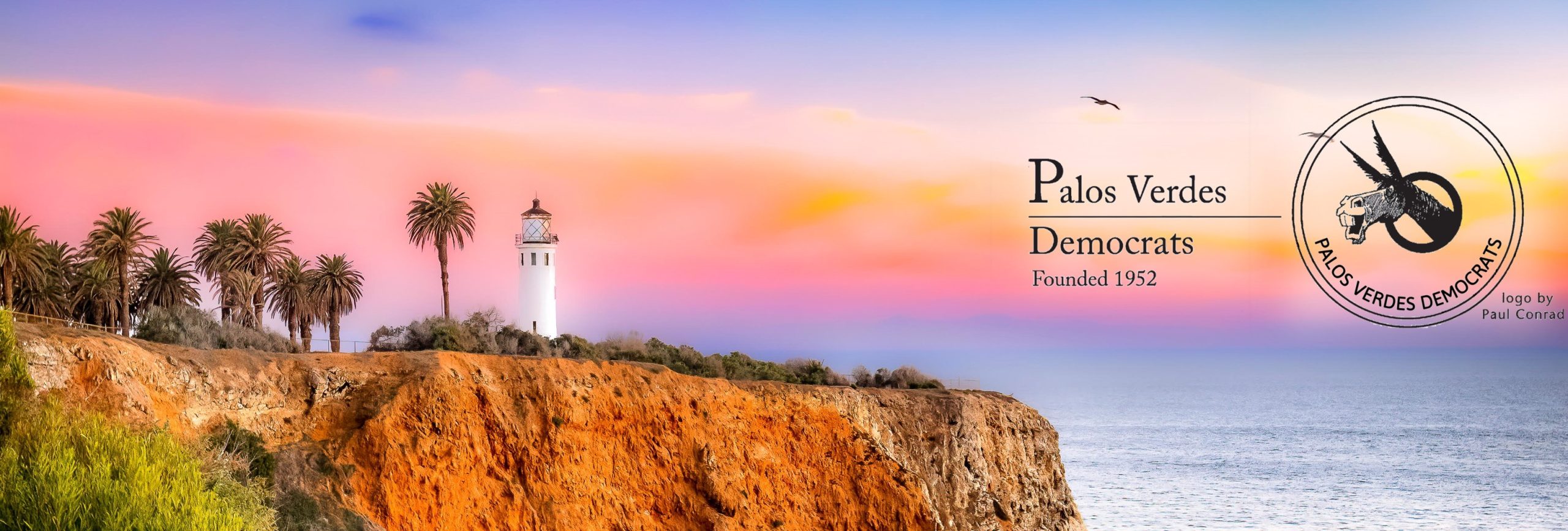
By Nancie Silver —
The Palos Verdes Democrats held a Zoom-only meeting on Sunday, August 20 due to the Tropical Storm Hilary Emergency Alert. The August meeting was our opportunity to hear Judge Tom Long’s commentary on the University of Irvine (UCI) Law review of the 2022-2023 Supreme Court cases and share his own thoughts on the court as well. Club Parliamentarian Carol Moeller introduced Judge Long and shared his background. The UCI panel was moderated by Professor Michele Goodwin, Chancellor’s Professor of Law, UCI Law and as Carol noted, “it was interesting the panel included three journalists and two lawyers.”
The first case was Moore v. Harper with Roberts, Kavanaugh and Barrett joining with the liberal justices to allow the North Carolina Supreme Court to deny the NC legislature’s poor defense of discriminatory gerrymandering plans. Judge Long thought this was the most important case of the term, with the 6-3 decision. The case highlights the Independent State Legislative theory that legislatures can do whatever they want without interference from state or federal courts. This is part of the argument that was made regarding the 2020 election, with some republicans saying state legislatures could appoint their own electors if they didn’t like the outcome of an election in their state. Judge Long said that had the case been decided differently, it would have put our democracy at risk, because all fifty states would be emboldened to do whatever they want and not adhere to democratic norms. Judge Long’s view is we have three wings in the current Supreme Court (with varying conservative justices depending on the case): the authoritarian wing with Thomas, Alito, Gorsuch; the conservative wing with Roberts, Barrett, Kavanaugh; and the liberal wing with Sotomayor, Kagan, Jackson. Watch the video for the full discussion and to learn more about what the legislature was attempting to do in their district maps using “cracking” or “packing”.
The second case, Creative LLC v. Elenis, was decided 6-3, with the court agreeing with the Web designer that she has a right to discriminate against LGBTQ persons by refusing services because doing so would violate her expressive free speech right. Judge Long said this was a difficult and complicated case, and he doesn’t think this case is viable precedent. Watch the video to learn more about public accommodation versus expression and pure speech (not conduct).
The next case was Alliance for Hippocratic Medicine v. FDA (regarding the banning of Mifepristone nation-wide) which was decided 7-2 against Hippocratic Medicine. In the recent August 16 announcement, the 5th Circuit Court reversed recent actions taken by the FDA to remove medically unnecessary restrictions on Mifepristone—one of two drugs used to self-manage abortion. The Court’s decision prohibits clinicians from prescribing Mifepristone through telemedicine and bans the sale of Mifepristone online and in retail pharmacies. Fortunately, this ban will not go into effect immediately due to actions taken by the Supreme Court in April to preserve medication abortion access during judicial proceedings. Judge Long said that this issue will likely be appealed to the Supreme Court so stay tuned.
UCI Law’s Michelle Goodwin raised the issue of ethics as it relates to the current Supreme Court, with a lot of discussion about Thomas’ and Alito’s willingness to accept gifts from wealthy donors without disclosing them as required. The main thought is that although it’s not quid pro quo the appearance of impropriety is problematic because it undermines the legitimacy of the court. Judge Long recommended we read the Propublica articles about this topic and Justice Alito’s responses. He said the justices depart from ethical rules required for state or federal judges, and Thomas and Alito’s responses make the justices appear naïve, unintelligent, or corrupt. There is no check on the court at this time because impeachment of any justice is not likely given the current Congress.
The next case was Students for Fair Admissions v. Harvard and v. North Carolina which was decided for the conservatives 6-3, with the majority claiming that affirmative action violates the Constitution. Moderator Michelle Goodwin talked about the work of Pauli Murray who influenced Ruth Bader Ginsburg. Murray wrote a book called States’ Laws on Race and Color describing racist laws (still on the books in 1952 or 1962). There was also a discussion about Thomas and Jackson’s divergent view of Black experience. Judge Long says the case does not abolish affirmative action; it says you can’t have racial specific quotas, but you can allow applicants to say how they have been disadvantaged by racial discrimination. The court did not overrule prior case law. [Note: If you’re interested, the 2021 documentary My Name is Pauli Murray is available to watch on Prime.]
The next two cases involve Native Americans and Indian Affairs. The first is Haaland v. Brakeen with a 7-2 decision (Alito and Thomas are in the minority, no surprise!) upholding the Indian Children Welfare Act (ICWA) that ruled that Native American children should be adopted by Native American families. The Arizona v. Navajo Nation 5-4 decision upholds the treaty narrowing the water rights of Native Americans. Judge Long said these cases show that Congress has the power to regulate Indian Affairs, and they have the power over treaties (and apparently the power to ignore the commitments it has made in those treaties!).
There was a brief discussion about whether the current Supreme Court is Thomas’ court, but neither the panel nor Judge Long think it’s Thomas’ court. Judge Long thinks Roberts tries to ensure Thomas writes mainly dissents. He argues it’s better to create coalitions to build consensus.
The next case, Biden v. Nebraska, was about student debt relief and was decided 6-3 for the conservatives. Biden’s executive order used the Heroes Act to argue he had the right to forgive student loans. Judge Long said that the majority argues the executive is less accountable than congress, but the irony is that the supreme court is the least accountable branch.
The final case was Groff v. DeJoy that was decided 9-0, upholding the claim that the US Post Office must allow employees the option to not work on Sundays because it places an undue burden on religious observants.
If you missed our August 20 meeting, I urge you to watch the video to hear about Judge Long’s additional observations. The first concept is religious freedom versus civil rights, and the second point is that the court’s decision overturning Roe v. Wade may not be the end of the discussion about abortion. This court may end up supporting a total ban on abortion if the conservatives argue that fertilized eggs are persons under the 14th Amendment. Judge Long also responded to the question about why he thinks some conservative justices seem to be drifting to the left, and about term limits or court packing, or taking away the jurisdiction of the court. He strongly suggested Democrats should be more focused on the judiciary, and liberal judges should figure out ways to be more persuasive, and write more majority opinions. Democrats need to support organizations like The American Constitutional Society; they need an organization that’s aggressive and well-funded to counter The Federalist Society. Judge Long reminded us that “Elections matter, votes matter, who is in a position to make appointments to the courts matter, and they matter a lot.”

Leave a Reply